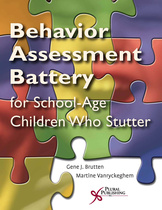Publication

Behavior Assessment Battery CAT-Communication Attitude Test Reorder Set
- Details:
- 4 pages, Illustrated (B/W), Saddle Stitched, 8.5 x 11"
- Included Media:
- Pack of 25
- ISBN13:
- 978-1-59756-123-5
- Release Date:
- 10/01/2006
Overview
The Behavior Assessment Battery CAT-Communication Attitude Test Reorder Set includes 25 copies of the CAT, one of the test procedures included in the Behavioral Assessment Battery.
The Behavior Assessment Battery (BAB) is a multi-dimensional set of inter-related, evidence-based, self-report tests that provide normative data for children between the ages of six and fifteen. The Battery has evolved and been refined over many years and has been used with an innumerable number of clients all over the world.
The test procedures include:
- The Speech Situation Checklists (SSC-ER and SSC-SD) for evaluating a child's emotional reaction to, and speech disruption in a range of speech situations
- The Behavior Checklist (BCL) reveals the particular coping responses that a child uses to deal with dysfluency
- The Communication Attitude Test (CAT) for measuring a childs attitude about his or her speech
These self-report test procedures provide speech pathologists and their professional colleaguesincluding teachers, psycho- and neurolinguists, clinical and educational psychologists, behavior therapists, and pediatricianswith a multi-dimensional view of how a child is affected by how he or she feels, reacts to, and thinks about his or her speech.
Through the eyes of the child whose fluency is problematic, the BAB test procedures provide a picture of the speech-related aspects of the childs world that only the child can validly supply. By evaluating a child's overall score on the SSC-ER, SSC-SD, BCL and CAT and his or her reaction to the particular items that make up these test procedures, clinicians can determine the most successful treatment strategies and tactics. This battery serves to shape therapy and it provides the therapist with clear-cut indications of a child's speech-associated strengths and weaknesses and his or her particular needs.
About The Authors
Gene J. Brutten, PhD, received his PhD from the University of Illinois, and was clinically certified in speech pathology and audiology by the American Speech-Language-Hearing Association. He was a fellow of the association and was awarded its Certificate of Recognition and Certificate of Appreciation. Professor Brutten was a founding member of the International Fluency Association and served as the editor-in-chief of its Journal of Fluency Disorders from 1989 to 2000. In 1971 and again in 1978, he received a Fulbright-Hays award to the Department of Foniatrie at the University of Utrecht Academic Hospital, the Netherlands, where he conducted clinically-based research. He co-authored the seminal book "Modification of Stuttering," has published more than 80 peer-reviewed journal articles, 20 book chapters, and has given over 200 professional presentations in three continents on differential assessment and behavior therapy. Dr. Brutten was an emeritus professor in the Southern Illinois University Department of Communication Disorders and Sciences, where he served as department chair, and in its Department of Psychology. In 2002, Dr. Brutten received the Honors of the American Speech-Language-Hearing Association, and in 2009, he was similarly honored by the International Fluency Association. Dr. Brutten passed away in March 2013.
Martine Vanryckeghem, PhD received her Master's Degree (1991) and PhD (1994) from Southern Illinois University after having worked for 12 years as a speech pathologist at a clinical center in Belgium. Dr. Vanryckeghem, who is a professor at the University of Central Florida, is clinically certified as a speech-language pathologist, is an ASHA fellow, and a Board Certified Fluency Specialist. She has published widely in peer-reviewed journals and has given workshops, internationally, with respect to the assessment and treatment of children and adults whose fluency is problematic. For her international endeavors, Dr. Vanryckeghem received ASHA's Certificate of Recognition for Outstanding Contribution in International Achievement. From 1990 until 2000, she was the managing editor of the Journal of Fluency Disorders and is currently an editorial consultant for several professional journals. Dr. Vanryckeghem is on the Scientific Board of different internationally-based organizations and serves as a consultant to faculty and students of various university-based clinical programs. She was inducted in the Scroll and Quill Society at the University of Central Florida.
Related Titles
KiddyCAT Reorder Set
Martine Vanryckeghem, Gene J. Brutten
50 pages, Illustrated (B/W), Pad, 8.5 x 11"
Behavior Assessment Battery SSC-ER-Speech Situation Checklist Reorder Set
Martine Vanryckeghem, Gene J. Brutten
8 pages, Illustrated (B/W), Saddle Stitched, 8.5 x 11"
Behavior Assessment Battery BCL-Behavior Checklist Reorder Set
Gene J. Brutten, Martine Vanryckeghem
4 pages, Illustrated (B/W), Saddle Stitched, 8.5 x 11"
Behavior Assessment Battery SSC-SD-Speech Situation Checklist Reorder Set
Martine Vanryckeghem, Gene J. Brutten
8 pages, Illustrated (B/W), Saddle Stitched, 8.5 x 11"
Behavior Assessment Battery for School-Age Children Who Stutter (BAB)
Gene J. Brutten, Ph.D., Martine Vanryckeghem, Ph.D.
Illustrated (B/W), Softcover, 8.5 x 11"
Treatment Protocols for Stuttering
308 pages, Softcover, 8.5 x 11"














